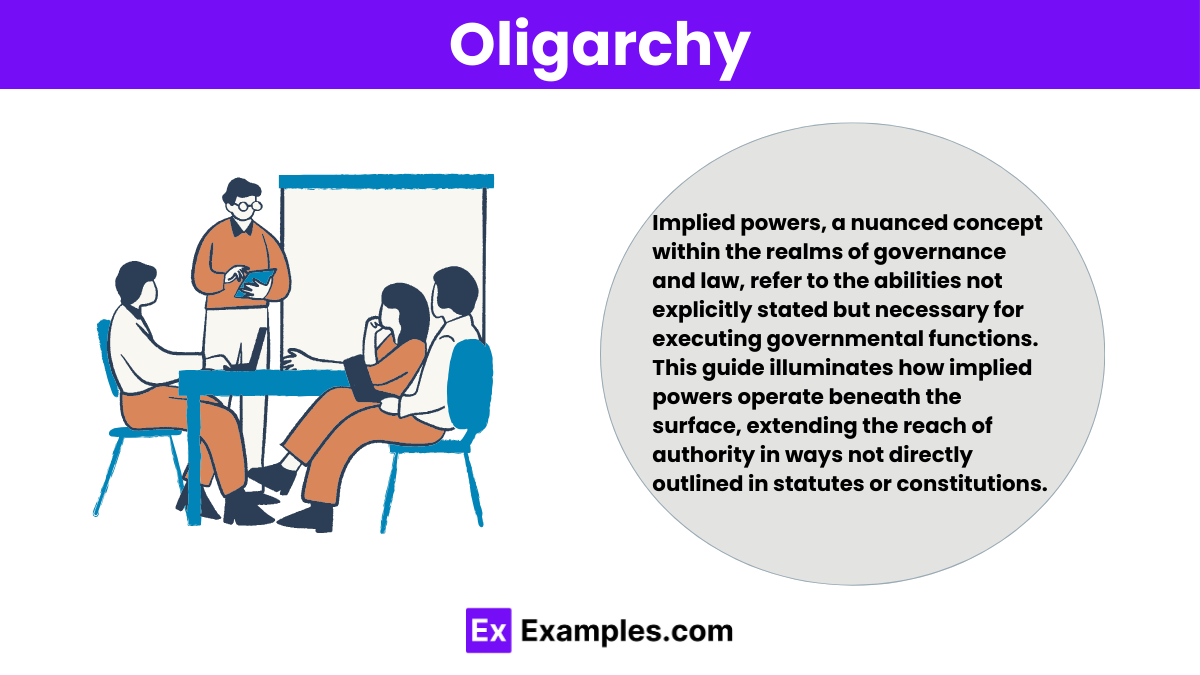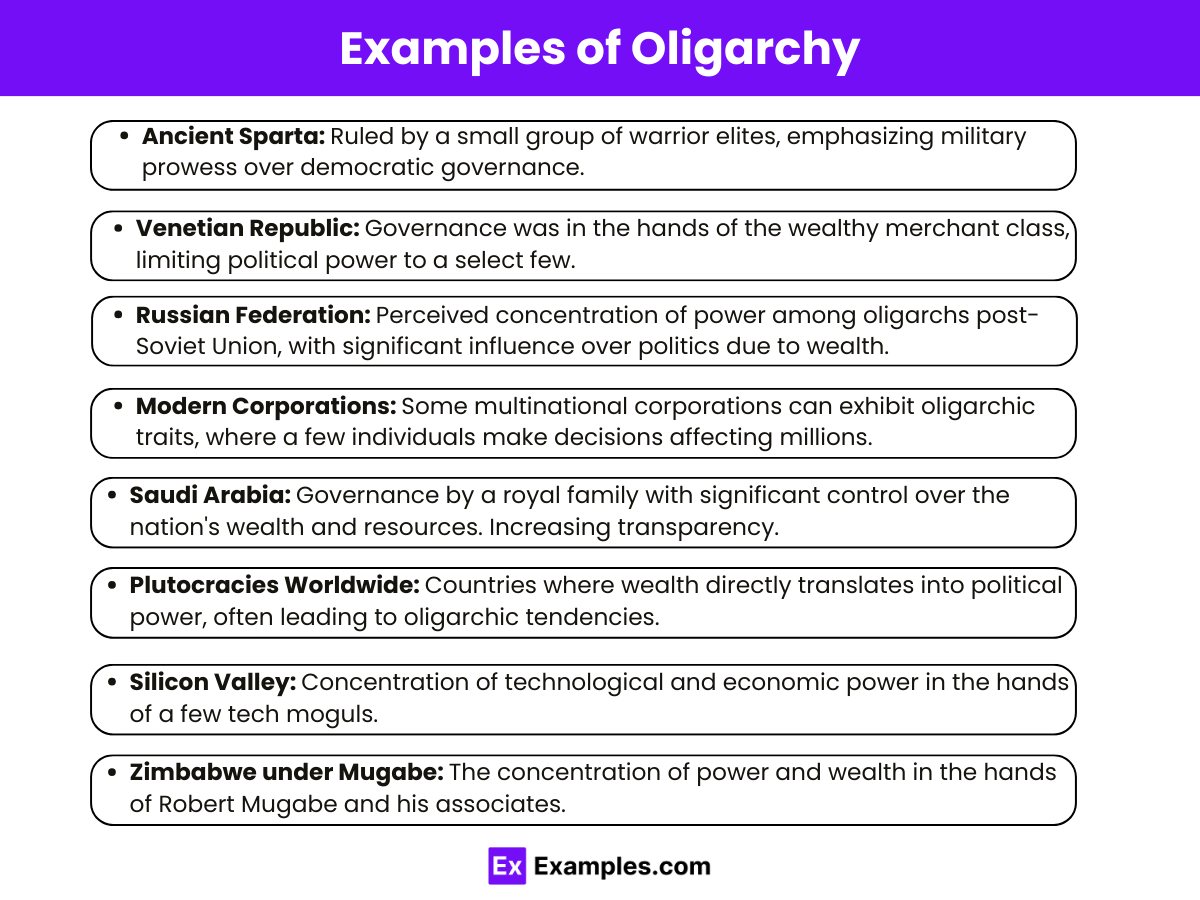Oligarchy Examples
Oligarchy, a form of governance where power is held by a small group of elites, intricately intertwines with the concept of imperialism, influencing socio-political landscapes globally. This guide delves into the essence of oligarchic rule, providing vivid examples to elucidate how such entities exert dominance, often extending their reach through imperialistic endeavors. By exploring historical and contemporary instances, readers gain insight into the mechanisms oligarchies use to maintain control, showcasing the profound impact on nations’ development and global affairs. Engage with this comprehensive exploration to understand the dynamics of oligarchy and its imperialistic underpinnings.
What is Oligarchy?
Oligarchy is a form of government where power effectively rests with a small number of people. These people could be distinguished by royalty, wealth, family ties, education, corporate, religious, or military control. Unlike a democracy, where the public has a considerable degree of participation in decision-making, an oligarchy restricts control to a few, often disregarding the needs and desires of the larger population. Oligarchy, a governance structure, centralizes authority within a select elite class, often characterized by wealth, lineage, or corporate affiliations. This concentrated power distribution contrasts starkly with democratic ideals, limiting broader societal participation in crucial decision-making processes.
Types of Oligarchy
- Aristocracy: Traditionally, power is vested in the nobility, distinguished by their noble birthright rather than capabilities or achievements. This form of oligarchy is often hereditary.
- Plutocracy: Wealth is the primary criterion for power. Individuals or families who possess substantial financial resources influence government policies and decisions disproportionately.
- Technocracy: Experts in specific fields, especially science and technology, dominate the decision-making process. Their expertise can lead to a narrow focus on technical solutions at the expense of broader social considerations.
- Theocracy: Religious leaders hold power, making decisions based on their interpretations of religious texts. This form can limit freedom of religion and expression.
- Military Oligarchy: Control is held by the military or a group of military leaders, often coming to power through a coup d’état. This type prioritizes military goals over civilian needs.
Examples of Oligarchy
- Ancient Sparta: Ruled by a small group of warrior elites, emphasizing military prowess over democratic governance. Introducing broader civic participation and reducing military influence in governance.
- Venetian Republic: Governance was in the hands of the wealthy merchant class, limiting political power to a select few. Implementing more inclusive voting rights and diversifying the economic base to reduce wealth concentration.
- Russian Federation: Perceived concentration of power among oligarchs post-Soviet Union, with significant influence over politics due to wealth. Strengthening rule of law and implementing fair electoral processes to dilute the power of wealth in politics.
- Modern Corporations: Some multinational corporations can exhibit oligarchic traits, where a few individuals make decisions affecting millions. Enhancing corporate governance, ensuring shareholder rights, and promoting stakeholder engagement.
- Saudi Arabia: Governance by a royal family with significant control over the nation’s wealth and resources. Increasing transparency, implementing reforms for greater public participation in government, and diversifying the economy.
- Plutocracies Worldwide: Countries where wealth directly translates into political power, often leading to oligarchic tendencies. Enforcing strict campaign finance laws, promoting political participation across socio-economic classes.
- Silicon Valley: Concentration of technological and economic power in the hands of a few tech moguls. Promoting competition, regulating monopolistic practices, and encouraging innovation among startups.
- Zimbabwe under Mugabe: The concentration of power and wealth in the hands of Robert Mugabe and his associates, leading to economic and social disparities. Implementing democratic reforms, ensuring free and fair elections, and establishing checks and balances in government.
Putative Oligarchies
Putative oligarchies refer to societies or organizations perceived as being controlled by a few individuals, but without clear evidence or widespread acknowledgment of such governance. This term encompasses situations where power seems to be concentrated among a small elite due to their influence, wealth, or social connections, leading to assumptions of oligarchic control. In putative oligarchies, the distinction between actual and perceived power blurs, creating a complex dynamic where democratic principles may be undermined by the shadow of elite dominance.
Intellectual Oligarchies
Intellectual oligarchies are governance systems or societal structures where a small group of intellectuals, experts, or scholars hold significant power, often influencing policy, culture, and education based on their knowledge and expertise. This elite group’s authority stems from their intellectual accomplishments and the value society places on knowledge and expertise. While intellectual oligarchies can drive innovation and progress, they also pose risks of excluding diverse perspectives and consolidating power among those with specialized knowledge, potentially sidelining broader democratic engagement.
Cases perceived as oligarchies
Cases perceived as oligarchies often involve scenarios where the control of a nation, organization, or sector appears to be concentrated in the hands of a few individuals or groups, leading to significant influence over political, economic, and social outcomes. Here are a few examples:
- Russian Oligarchs Post-Soviet Union: Following the fall of the Soviet Union, Russia saw the rapid rise of business magnates who acquired considerable wealth and political influence, leading to perceptions of an oligarchic control over the country’s resources and political decisions.
- Tech Giants in Silicon Valley: Companies like Google, Apple, Facebook, and Amazon are sometimes viewed as part of a modern oligarchy due to their unparalleled influence over global technology, media, and commerce, impacting everything from privacy rights to market competition.
- Wall Street and Financial Sector: The concentration of financial power in a few major banks and investment firms, along with their role in influencing economic policy and regulations, is often cited as an example of oligarchic influence in the United States.
- Media Conglomerates: A small number of corporations controlling a large percentage of the media landscape can lead to perceptions of an oligarchy, where public discourse and information are significantly shaped by the interests of these entities.
- Political Dynasties Worldwide: In various countries, political power is often concentrated within certain families across generations, leading to oligarchic structures within governments, where a small elite maintains control over political institutions and decision-making.
History of Oligarchy
Oligarchy, with roots tracing back to ancient Greece, signifies rule by a few. Historically, it emerged in societies where power was unequally distributed, often leading to social and economic disparities. Modern examples can include corporations controlled by a few individuals or countries governed by powerful elites. The history of oligarchy reveals a pattern of power consolidation, resistance, and reform.
To address oligarchy, reforms must focus on enhancing democratic governance, enforcing legal frameworks that limit power concentration, promoting transparency and accountability, and ensuring equitable distribution of resources. Strengthening institutions that safeguard democracy, alongside fostering civic education and participation, are vital steps towards dismantling oligarchic structures. These measures can help transition power from the few to the many, ensuring more democratic and equal societies.
FAQS
What countries are run by oligarchy?
Countries perceived as run by oligarchy often include Russia, where wealth and political power are concentrated among a few elites, and China, with its centralized power structure within the Communist Party.
Who is the father of oligarchy?
The concept of oligarchy doesn’t have a singular “father,” but Aristotle is often credited for extensively analyzing and critiquing oligarchy in his works, particularly in “Politics.”
Oligarchy, a governance form dominated by a small elite, undermines democratic principles and equitable power distribution. Through historical insight and modern examples, it’s clear that addressing oligarchy requires systemic reforms aimed at enhancing democracy, transparency, and civic participation. Ultimately, dismantling oligarchic structures is essential for fostering inclusive and representative governance systems.




